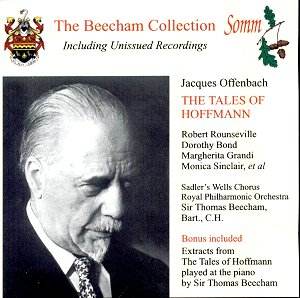This set of The Tales of Hoffman is the
soundtrack to the famous Powell-Pressburger film of 1951 though
it was recorded at Shepperton Studios in 1947 for Decca. Looking
back at the Record Guide of the early 1950s and reading the review
of this performance – a bit of a stinker – prepared me for the
worst. But in the end I found much here that is compelling, though
it can’t be denied that the orchestral contribution is on something
of a different plane from that of the singers, a rather incongruous
multi-national bunch. Messrs Shawe-Taylor and Sackville-West were
in fine snickering form when they traduced the American tenor
Robert Rounseville as a Yankee college boy. Well, transatlantic
he may have been but that’s no impediment to suave characterisation.
In fact he’s perfectly acceptable if not outstanding. There’s
a bit of spread toward the bottom of his compass but he brings
energy to a role I could imagine would well have suited Heddle
Nash, rather better really than Rounseville. His Olympia is Dorothy
Bond, fearless in coloratura and strikingly dramatic. Margherita
Grandi’s Giulietta is perhaps just too elegant for the role but
Welsh bass-baritone Bruce Dargavel makes a strong showing; the
voice is not always perfectly centred but in compensation he has
bags of character and is one of the stars of this performance.
In the smaller roles we have a veritable cornucopia of emergent
talent; Monica Sinclair shows real embryonic talent as Nicklausse,
querulous, demanding and suitably assured; well-sustained bottom
of her range as well, even this early in her career. Owen Brannigan
takes three little roles being especially sarcastic as Schlemil,
Offenbach’s little joke of a name. Murray Dickie, later of course
a stalwart in Vienna, is here in the roles of Cochenille and Pitichinaccio.
One of the more intriguing turns – that’s the best way I can describe
it – is that of Grahame Clifford. Now Clifford was a famous member
of D’Oyly Carte’s troupe and there’s more than a whiff of the
London stage about his impersonation and patter. He does a fine
parlando act for example in There sleep in peace in the
First Act though I can certainly imagine that this won’t
be to all tastes and even more so is his eyebrow cocking G and
S knockabout in And now, Ladies and Gentlemen later on
in the Act.
There are other obvious points to note. There
are very heavy cuts and the opera is sung in English in the Arundell
translation. The Chorus is on firmly Anglo form in the Guests’
Chorus – more Marylebone than Montparnasse - but contribute their
relatively light share to the proceedings. The orchestra is on
song - really splendid. They are ebullient in the Prologue’s Finale,
percussion to the fore, brass ringing and are wonderfully alert
in Her reputation well deserved where Beecham allows woodwind
pointing of marvellous wit. The strings shine behind Rounseville
in his dramatic Act II Fair Angel and the principal clarinet
(Reginald Kell?) shines brightly in the Third Act No more to
sing alas. Beecham, of course, is the real star, a ringmaster
who had been acquainted with the work since at least 1910 when
he’d actually gone into the recording studios in his very first
sessions to record snippets from the opera (for Columbia with
Caroline Hatchard, Walter Hyde, Frederick Ranalow and Edith Evans.
Yes, that Edith Evans). His affection and dramatic impetus
are everywhere apparent, his control of tension and line, his
limpid accompaniments and eruptive Francophile drive. As an adjunct
and selected from more than two hours of surviving material is
a fifteen minute segment of Beecham going through the opera on
the piano whilst singing – the word is an approximation for the
sounds that are emitted by the knighted orifice – bits of the
score for Powell and Pressburger’s delectation (they didn’t know
the score; it was the conductor who had originally approached
them).
So in conclusion this is hardly likely to be
anyone’s first or fourth choice. It’s cut, in English, with some
quixotic voices. But the recorded sound has come up really very
well. There is joie de vivre from Beecham and orchestral excellence
as well as a treasurable sense of time and of place, which I found
frequently uplifting.
Jonathan Woolf
